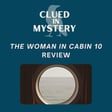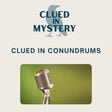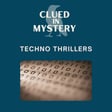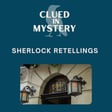Become a Creator today!Start creating today - Share your story with the world!
Start for free
00:00:00
00:00:01

Real life amateur sleuths
We love reading about ordinary people who solve fictional mysteries. What about ordinary people who solve real mysteries? In today's episode, Brook and Sarah discuss real life sleuths.
Discussed
I’ll Be Gone in the Dark (2018) Michelle McNamara
I’ll Be Gone in the Dark (2020) HBO
Title fraud: How a Toronto real estate lawyer helped thwart alleged scammers
Home Before Dark (2020) Apple TV
For more information
Instagram: @cluedinmystery
Contact us: hello@cluedinmystery.com
Music: Signs To Nowhere by Shane Ivers – www.silvermansound.com
Transcript
Transcript
Introduction to Amateur Sleuths and Cozy Mysteries
00:00:11
Speaker
Welcome to Clued in Mystery. I'm Sarah. And I'm Brooke. And we both love mystery. Hi Brooke. Good morning Sarah. How are you? I'm doing great. How about you? I'm great. And I can't wait to talk about this really fascinating topic, real life amateur sleuths.
00:00:33
Speaker
Yeah, so I've been thinking a little bit lately about real people who've solved real crimes. I mean, what mystery fan hasn't dreamed of living in a small community with an unusually high number of deaths they stumble upon and solve? I think the appeal, especially for readers of Cozy Mysteries,
00:00:50
Speaker
is imagining themselves in similar situations. So let's talk about some mysteries that were solved by ordinary people. And by ordinary people, I mean people who aren't detectives or other professional investigators.
00:01:05
Speaker
So although Brooke, you and I are going to talk about some mysteries solved by real people, we should probably mention that there's a risk associated with amateur investigations. They can either compromise the police process or compromise the sleuth's own safety.
Real-life Sleuthing Stories and Examples
00:01:19
Speaker
I can give an example. There's a lot of bike thefts here in Vancouver. And a few years ago, after a woman found a Craigslist listing for her stolen bike, she met up with a thief and asked if she could test it out and then rode off with it.
00:01:33
Speaker
She ended up being unharmed, but afterwards the police here had to issue a statement along the lines of, do not do this. Oh, yes. I mean, it was very clever, right? She did a very cozy mystery thing to go grab her bike and steal from the thief. Totally. That could have gone bad. Yes. Let's get started.
00:01:58
Speaker
So one thing that I learned about that I had never known of until we started researching this topic a little bit was there's a actual website called web sleuths and this is an internet community. They primarily focus on solving missing person cases.
00:02:15
Speaker
But it's privately owned and you create an account and register to be on the case. Members have the option to be verified with their credentials. So like sometimes there's DNA analysis professionals or law enforcement people like perhaps retired or even somebody who is specifically related to the crime in some way. But they have actually helped solve some cases, probably their
00:02:41
Speaker
biggest case they helped solve was the high profile case of Abraham Shakespeare. Mr. Shakespeare was a Florida man. He worked as a laborer, but in 2006, he won a $32 million lottery. Then in 2009, his family declared him missing.
00:03:00
Speaker
And in 2010, his body was found under a concrete slab in the backyard of one of his acquaintances. Right away, police speculated that Shakespeare's financial advisor, whom he'd hired to help him organize this huge amount of money that he'd won, her name was Dee Dee Moore, and they suspected that she might have information about what happened to him, but the trail went cold. They weren't able to pin it on her.
00:03:27
Speaker
Well, members of Web Sleuths began digging into the situation and they agreed that Dee Dee Moore definitely had some information on this. Well, their conversations, this is a forum. So these different people were chiming in and discussing Moore's potential involvement.
00:03:45
Speaker
and more learned about the forum and couldn't help herself. She created an account under a fake name in order to interact on the platform and essentially defend herself. But they were so smart. These incriminating comments she made on the site, which she didn't realize she was making, compared with the emails she sent as herself were cross-referenced, and web sleuths were able to trace it back to the same IP address.
00:04:14
Speaker
So in 2012, Moore was convicted of first degree murder for the killing of Shakespeare and was sentenced to life in prison without the possibility of parole. Fascinating.
00:04:28
Speaker
I know. And I think that's one of the things about the internet is it allows people to do this investigating from home without really risking themselves like I mentioned at the beginning, right?
00:04:45
Speaker
Um, yeah, that's, that's, that's super fascinating. And I know like, you know, if you look at the comments on under any kind of news story, there's lots of people who have lots of opinions. Um, I imagine that, um, that that's a pretty fascinating place to, uh, to read.
00:05:07
Speaker
And I thought it was interesting that we have, um, and we, we'll see this at sometimes in fiction, the criminal that just couldn't keep their mouth shut. Yeah. I mean, that was her downfall, right? Like, why wouldn't she just walk away? Yep.
00:05:22
Speaker
So another at-home sleuth is Michelle McNamara. So she was a true crime researcher. I think early in her life, she had been close to quite a violent crime and that made her very interested in true crime. And she had a blog where she was, you know,
00:05:48
Speaker
talking about various other crimes and other investigations. But she wrote extensively about a series of rapes and murders that were committed in California. And she actually linked what were previously thought to be separate crimes to a single individual.
00:06:06
Speaker
Um, so she actually died before he was caught, but police credited the work that she did in helping them solve the case. Uh, and so in 2018, a couple of years after she died, um, a book that she had started writing, I'll be gone in the dark was published detailing her investigation, her husband, and I think a couple of other people, uh, finished, finished the book, um, after, after her death. And there's also a series on HBO with the same name, I'll be gone in the dark. And that was released in 2020.
00:06:36
Speaker
So, I haven't actually read the book or seen the series, but I definitely remember hearing about it. I know, Brooke, you're a bigger fan of True Crime than I am. Have you read or watched either of those?
00:06:51
Speaker
No, I haven't. I mean, I've kind of been aware of that case and I'm really interested in that. I think that she shares that thing that so many true crime investigators do where they had something tragic happen to them as a young person, whether it happened to them or someone in their family. I think you see that a lot in some of those people who then go on to investigate.
00:07:17
Speaker
Yeah, definitely. I think it just leaves that indelible mark on people and they almost can't help themselves to continue to look into either that particular crime or other similar ones.
Fraud Cases and Investigative Journalism
00:07:31
Speaker
Definitely.
00:07:32
Speaker
Well, my next one is a case I learned about from listening to a podcast, speaking of true crime. And this is the case that has been dubbed Scamanda. It's the Amanda C. Riley case. And she lied for over a decade about having cancer and was brought down by a determined journalist, Nancy Moschicello.
00:07:54
Speaker
So, Amanda C. Riley was already peripherally in law enforcement sites when journalist Nancy Moscichello came on the scene. She lived in proximity to Riley who had become somewhat of a local celebrity for this blog that she was publishing detailing her life as a young mom and struggling cancer patient.
00:08:17
Speaker
She was also very active in a mega church where she would speak practically weekly. She had become a celebrity there as well, giving these inspirational testimonies to other churchgoers, kind of this, if I can do it, you can do it message.
00:08:34
Speaker
And she would explain that, of course, as a cancer patient in and out of treatment for years and years on end, she'd been unable to work and her family's resources were stretched thin. And she was getting lots and lots of money, gift cards, airline miles, free daycare, free spa treatments.
00:08:52
Speaker
not only from her church family in person, but also this blog that she had created. But here's the thing, as I spoiled at the beginning, Amanda didn't have cancer. She never had cancer. And journalist Nancy smelled something fishy the very first time she went to Amanda's blog site because Nancy knew firsthand what it was like battling cancer. She lost both a sister and her mother to the disease.
00:09:18
Speaker
And she could just tell that Amanda's effect, it's always over the top, bubbly and positive and full makeup and perfect hair. It just didn't connect with somebody who is going through chemotherapy or other kind of cancer treatments. But as we know, white collar or financial crimes really don't get a lot of police resources. So yes, they were...
00:09:44
Speaker
I had kind of gotten some tips that maybe this wasn't on the up and up, but it just really hadn't come to the surface for them. And then in addition, HIPAA laws made it really difficult for them to get any information at all. But Nancy, as a citizen sleuth, went to work to prove
00:10:04
Speaker
that Amanda didn't have cancer. She knew that if she could prove that as a domino effect, it would show that she was conning people out of this money. So Nancy had to use really clever questioning because this was medical information and just stubborn determination, just like our favorite fictional sleuths, I think. And it took years and years, but she eventually saw Amanda convicted of five years in prison.
00:10:31
Speaker
with an order to pay restitution of over $100,000, which I truly believe is like a tiny fraction of what she conned people out of for years on end. That's really interesting. I don't think that's the first case like that that I've heard of, of someone pretending to have some terminal illness and really benefiting from other people's generosity.
00:10:58
Speaker
Right. Um, we hear about some of that from, um, like the, not just go fund me, but those type of sites where you can set up some sort of a charity account and then people have big hearts and they don't want to see somebody hurting. And then they're able to profit from it.
00:11:18
Speaker
Well, so that makes me think of a case or a series of cases that have been happening here in Canada. I don't know if the same thing is happening in the US, but it's real estate title fraud.
00:11:32
Speaker
So it's another white collar crime. And so there have been some news reports where houses have been sold without the owners knowing. And these are often second residences or, you know, if someone has multiple homes that they're renting out or whatever it is. So they're not resident in the homes. And so what happens is someone creates false identification in the name of the home's actual owner.
00:12:01
Speaker
and initiates a sale. And so there was a real estate lawyer in Toronto who became suspicious about a transaction that he was involved in after the bank called him to just confirm a couple of details. So he felt that something was up and actually took the initiative to go and knock on neighbors' doors.
00:12:23
Speaker
of this house that was supposedly for sale. Just to verify who the owners of the house were and discovered that they were not the people that had approached him to sell the house. And so he went to the police and he actually worked with them in like a sting operation to snag the criminals, which I think is, you know, he's being a real crime solver.
00:12:52
Speaker
That is so fascinating. I know you shared with me about this kind of ongoing issue that you had heard about some months ago, and I've just thought about it since. We're in a real estate boom right now in the area especially that I live in, and I see the signs now and I think, I wonder if there's something fishy going on behind the scenes there.
00:13:17
Speaker
Well, and I guess there was this whole network of people that were involved in this and they would kind of look at the names of the actual owners of the homes and then in this network would find people who looked like that might be their name. And so got documents created in the owner's names, you know, a driver's license or some other photo identification.
00:13:44
Speaker
And, uh, yeah, so it was like quite an elaborate, um, very sophisticated. Yeah. Yeah, totally. So, yeah, good for this guy, this, this lawyer for thinking something wasn't right.
00:13:58
Speaker
Absolutely. He's a hero. Well, my last case, Sarah, I think you're going to agree that this story would be an excellent setup for a mystery series. So at a class reunion, Rose Morales and Cheryl Sanchez Simmons learned that 50 years before a young girl who had been their age was killed in their hometown.
00:14:19
Speaker
They, after learning this, went and told another friend that also lived in that hometown, Tina McKillop, and the trio decided that they were going to find out what happened to this girl. It was a case that had never been solved.
00:14:32
Speaker
And then their backgrounds are so ideal for a group of sleuths. We have Sanchez Simmons. At the time they went to work together, she was 66 and she had worked for Orange County's Public Health Authority. Morales was 68 and she worked for a logistics company.
00:14:50
Speaker
And McKillop, she's a little younger. She was 64 and she had been a researcher who helped adoptees find their birth parents. So they had this great set of skills to be researchers and investigation specialists. They even printed business cards that read California girls investigations
00:15:09
Speaker
The O in California is shaped like a little magnifying glass with long eyelashes. And they compared their findings in a Facebook chat group that they created called the Snoop Sisters. Solving a cold case that is over half a century old is a daunting prospect, of course, for even law enforcement professionals, let alone amateurs. But this was really personal to them because for one, they had never learned of it, which they thought was very interesting.
00:15:38
Speaker
And they realized that this was in their neighborhood, their town. It could have been any of them. And so they really wanted to find out what happened to this girl who had been named Jan Marsh.
00:15:50
Speaker
So the women started with trips to the library. They would spend weekends and time off and just search through microfilm on old newspapers. But it soon became clear that they really needed like the police records, right? So they went to talk to the police and they found themselves in this frustrating position that cases that haven't been solved are still considered open.
00:16:16
Speaker
even if they aren't being actively investigated. So they're like, we can't say anything. This is an open case. But the women remembered seeing the name of Bill Hefley in some of those newspaper articles. And he was the rookie officer who had been on the case and then actually took over the cold case
00:16:35
Speaker
work in the mid-1970s. So they contacted him. He was more than willing to talk and he even said, I think I have a box of those files in my attic. And he did. So the ladies were able to uncover several really good leads, leads that had never really been followed up with by police officers back in the day.
00:16:58
Speaker
And like a story, they started knocking each one down. This one had an alibi. This one wasn't in the area at the time, whatever. So they were losing their suspects as well. And time wasn't on their side. Several of the people who had been involved in the case had already passed away. This is 50 years later.
Amateur Sleuthing: Pros, Cons, and Impact
00:17:19
Speaker
And many former friends and relatives of Jan Marsh were now growing
00:17:23
Speaker
too old to remember information clearly. But during some of their investigations, they did gather some DNA, a DNA sample from one of their most likely suspects. So this was what they were hanging their hope on. And they went to the police and they said, we have this DNA and we'd like to cross reference it with the DNA evidence that would still be on file. They had been told that it existed, but by this time, the box had been lost.
00:17:52
Speaker
Possibly destroyed or misplaced but the police department could no longer find the box of information so that was such a like theatrical thing to happen because don't we see that a lot of times in fictional mysteries that you're hanging your hope on this thing.
00:18:10
Speaker
So unfortunately, the women have not been able to solve this case as of yet, but they haven't given up. They continue to look, they continue to work with their forum online. And they've even found two other cold cases from the area that they grew up in that they want to investigate. So the California girls investigations continue.
00:18:32
Speaker
Oh, I love that, Brooke. You're right. This is such a great setup for a mystery. And actually, I think there is a series that features older women as the sleuths. I may have mentioned it before. It's set in the UK. It's the Wise Women series by Kathy Ace. And it's a very similar setup where they
00:18:55
Speaker
older women who've had careers doing other things who come together and act as PIs. I love that story. I know. I wish that it was a triumphant ending that they had, even if that person is already deceased, that they were able to basically solve the case.
00:19:17
Speaker
But I think that probably more often than not, that's a much more realistic thing that happens. And even going through this process and being helpful and finding out information to give to the case was still probably a very validating thing for them to do. And as a group of women together, I imagine that they really found a lot of camaraderie in that.
00:19:44
Speaker
Totally. You know, you're just talking about some older real life sleuths. I've got an example of a young real life sleuth. So there is a girl in the U.S. named Hildy Lissiak, who at nine started, or maybe she was even younger, but she started a newspaper in her town because there wasn't one.
00:20:07
Speaker
And her dad had been a journalist in New York, and then the family had moved to the small town that he had grown up in. And she reported on various goings on in the town. At one point, she broke the story of a murder that had happened, which actually brought her some national attention. She, I think, was on Good Morning America talking about this.
00:20:32
Speaker
And she was only nine. I was reading some articles about her where she talks about one of the cases that she was proudest of investigating as a journalist was looking into drugs at the local high school, which led to some consequences, I imagine, for some of the people who were involved. I think she's only 16 or 17 years old now, so still quite young.
00:21:01
Speaker
But she and her father co-wrote some books targeted at young readers, which my son and I have actually read and enjoyed about her investigating various cases as a journalist in town. And then she was the inspiration for Apple TV's Home Before Dark,
00:21:24
Speaker
which I haven't seen, but again, is one of those that I've heard about. And I'm definitely going to check out now that I know that she was the inspiration for that.
00:21:36
Speaker
Oh my goodness. What a fantastic young woman. I am just thrilled. Just the, just the part of starting the newspaper because her town didn't have that resource. You know, like you had me right there. And then the fact that she was like breaking stories, like she was doing actual investigative journalism as a small child. That's absolutely wonderful. I love it. I love it so much.
00:22:03
Speaker
Yeah, so I think it's fantastic, and I'm sure she's going to continue to do some really interesting investigations as she gets older and graduates high school. Yeah. What will she be in the world? She's going to be one to watch.
00:22:21
Speaker
Totally. Maybe I'll just mention, I was watching recently a documentary about Agatha Christie and someone was talking about how true her depictions of victims' reactions to various poisons were.
00:22:39
Speaker
And there have been a few cases where people who have read her books have recognized poisoning in real life. So there's a couple of nurses that recognize thallium poisoning in their patients after having read a couple of her books, which I think is pretty neat.
00:23:00
Speaker
I think that is wonderful. And without giving too much away, that may happen in one of my mysteries, Sarah. I love it. Well, Brooke, I think this has been a really interesting conversation. Before we end for today, though, I think maybe we should just mention again how being an amateur sleuth can carry some risks with it.
00:23:30
Speaker
Absolutely. You know, when cases go viral, they can glean a lot of new information much faster than a normal police force could just because of the sheer manpower and all those minds and conversations. But that can also overload an investigation with
00:23:48
Speaker
tip lines overflowing and false information taking over the truth. So I think that there's pros and cons and I think there's just some sensitivity that needs to be had because these are real life crimes and we need to remember that. I was reading a Reddit article thinking about, you know, why are we fascinated by these things? And you and I talk about that a lot, Sarah, like why we love mystery.
00:24:13
Speaker
There's a great quote. This person says, I think people are here because it gives them some semblance of control over a tragedy that they otherwise would have no influence over. I thought that was super smart. I would pose that this is the reason we like reading fictional mysteries too. That feeling of control, of conclusion, closure, it gives us when real life just usually doesn't turn out so neat and tidy.
00:24:41
Speaker
But thank you everyone for joining us today to discuss real life sleuths. I'm Brooke. And I'm Sarah. And we both love mystery. Clued In Mystery is produced by Brooke Peterson and Sarah M. Stephen. Music is by Shane Ivers at Silvermansound.com. Visit us online at CluedInMystery.com or social media at Clued In Mystery. If you liked what you heard, please consider subscribing, leaving a review or telling your friends.
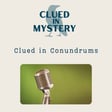
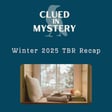
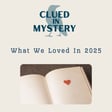
![[Re-release] Anthony Berkeley image](https://media.zencastr.com/cdn-cgi/image/width=112,quality=85/image-files/61e1c276e3ec42007857cff9/e7c778ac-a2ba-4809-9a5c-7cd39d167834.jpg)
![[Bonus] Wake Up Dead Man image](https://media.zencastr.com/cdn-cgi/image/width=112,quality=85/image-files/61e1c276e3ec42007857cff9/e276ac32-e664-464f-956c-7699bdb60aa5.jpg)
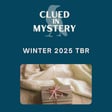

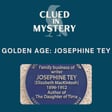
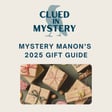
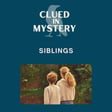

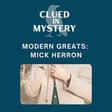
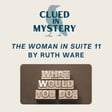
![[Bonus] Read Along: Daughter of Time image](https://media.zencastr.com/cdn-cgi/image/width=112,quality=85/image-files/61e1c276e3ec42007857cff9/b953ad72-c43e-48ca-a18a-b3c216ab90ee.jpg)
